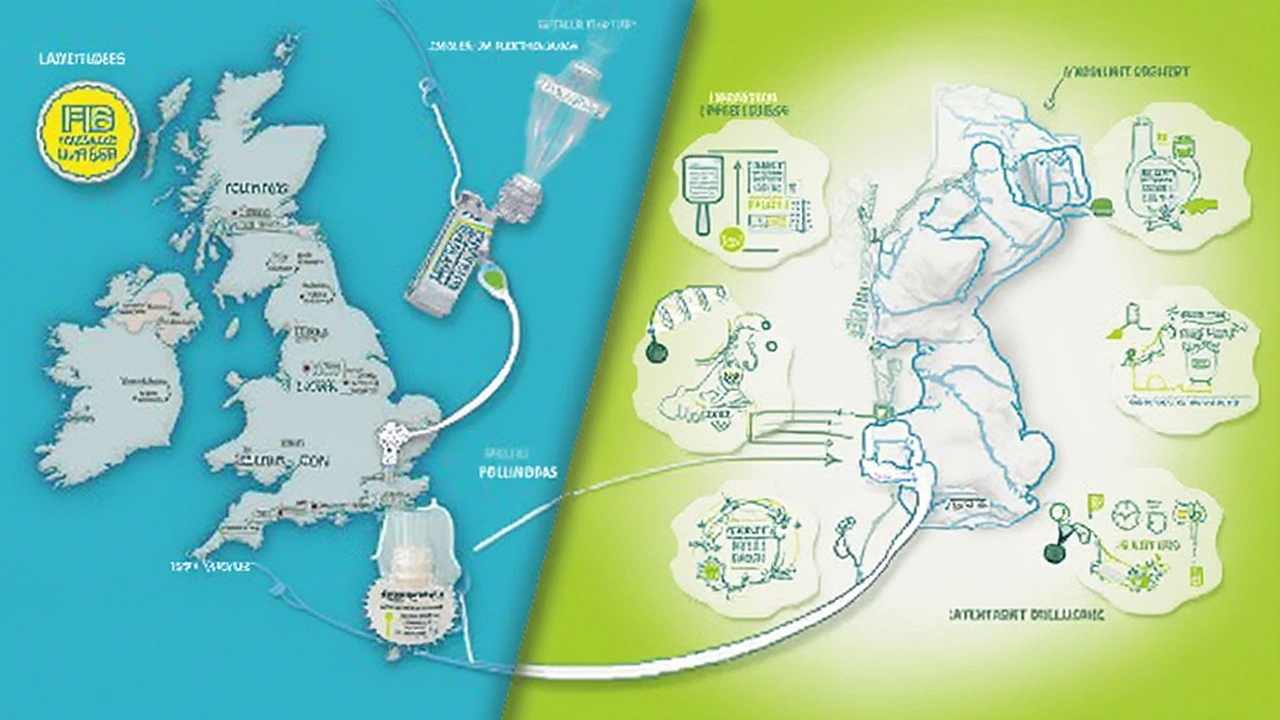Primatene Mist vs. OTC Inhaler Alternatives: Safety, FDA Status, and Proper Use
What Exactly Is Primatene Mist and Why Is It Controversial?
Say you’re looking for quick asthma relief in a pinch. Primatene Mist probably jumps out at you on the pharmacy shelf, promising easy, instant breathing help without a prescription. But what’s really inside that quit-breathing-in-a-bottle, and why does its very existence stir up heated debates among doctors and patients?
Primatene Mist isn’t some new chemical wizardry. It’s essentially an epinephrine inhaler. Yep, the same kind of adrenaline you’d find in an EpiPen—only tweaked for spraying straight into your lungs. The first thing that sets it apart is that it's over-the-counter (OTC). No doctor’s visit, no insurance, no waiting. Sounds convenient, right?
Here’s the twist—the FDA originally pulled Primatene Mist from the market in 2011. Why? It wasn’t actually the medicine itself, but the old propellant it used. That propellant, called CFC (chlorofluorocarbon), was eating away at the ozone layer. When the company swapped the old CFCs for a new propellant (HFA, also used in popular prescription inhalers like ProAir and Ventolin), it got the green light to return in 2018.
But controversy stuck around. Doctors stay divided on whether epinephrine inhalers like Primatene Mist are a great backup or a risky shortcut. Modern prescription inhalers (think albuterol) are what most people use for rescue treatment. Still, for folks unable to access a prescription—in between insurance, doctors, or diagnoses—Primatene Mist feels like a lifeline.
The crux of the argument is safety. Epinephrine works differently in your body compared to albuterol. It’s broader—hits more receptors, which can lead to not just lungs opening up, but also jitters, fast heart rates, and sometimes scary side effects if misused. That’s one reason the FDA says Primatene Mist should only be used for mild symptoms in people who already know they have asthma. Kids under 12? Not recommended. People with heart issues? Talk to your doctor first or skip it entirely. The easy access makes it tempting, but it also means people sometimes skip critical medical checks they’d otherwise get with a prescription.
Despite these red flags, millions of units have been sold since the relaunch. Some see that as proof it fills a real need, others as a sign more folks are skirting necessary medical care. Either way, Primatene Mist isn’t going anywhere—it’s the only FDA-approved OTC inhaler in the U.S. right now. That makes it a big deal for people who need a bridge between doctor visits, but a real headache if used wrong.
How Epinephrine Inhalers Measure Up to Prescription Options
To grasp what makes Primatene Mist different from, say, prescription albuterol inhalers, you’ve got to look under the hood. Epinephrine (the drug in Primatene Mist) works on both beta and alpha receptors in your body. Albuterol (the go-to prescription rescue inhaler) is a little more targeted—it acts mainly on the beta-2 receptors in your lungs, relaxing your airways without amping up your heart as much.
A real-life example: Spray two hits of Primatene Mist and you might find not just easier breathing, but also a racing pulse, jittery hands, maybe feeling a bit on edge. Albuterol, by contrast, tends to deliver smooth airway relaxation with fewer side effects—though in high doses, even it isn’t totally side effect-free.
There’s something else worth paying attention to: dosing. Primatene Mist gives 0.125 mg of inhaled epinephrine per puff. Doctors usually recommend no more than eight sprays in 24 hours for adults. Hitting that limit too often? That’s a red flag you’re not controlling your asthma well and should see a doctor, pronto. Prescription inhalers like albuterol are prescribed with a clear asthma action plan, and your use gets tracked—way less room for guessing or dangerous overuse.
Effectiveness, too, varies. Several U.S.-based studies found that while Primatene Mist will ease mild asthma symptoms, it isn’t as consistently reliable for moderate to severe attacks. One meta-analysis in 2021 showed albuterol had a faster onset and greater peak airflow improvement than epinephrine inhalers. That’s why E.R. doctors reach for prescription inhalers, not OTC options, during real emergencies.
And in case you’re into numbers, the side effect rates for Primatene Mist tend to be higher. Common issues? Quickened heartbeat (palpitations), nervousness, headaches, and the sense you just drank one too many energy drinks. The FDA’s own review panel pushed for some of the most prominent warning labels on any OTC asthma product, because the worry isn’t about the formula gone bad, it’s about people missing the early signs of severe asthma, self-treating for too long, and showing up at the hospital way too late. Scary, but proven true by hospital admission records.
Prescription inhalers win out on one other count—they’re usually covered by insurance, and modern ones are built for careful dosing and reliable delivery. If you want to see how other asthma inhalers stack up, check out this easy-to-follow guide on picking an alternative to albuterol inhaler.

Smart, Safe Usage: What the Labels and Doctors Really Say
Walk into a drugstore, grab Primatene Mist, and the instructions on the box seem straightforward. One or two sprays at a time, wait at least four hours between doses, don’t go over eight sprays a day. So why does misuse keep popping up in medical journals?
Part of the issue: the fast relief masks bigger problems. If you’re needing your epinephrine inhaler more than twice a week for symptoms, medical guidelines say that’s a problem—your asthma isn’t under control. It’s tempting to just keep spraying, especially if it means you can avoid a pricey doctor visit or time off work. But that’s how people accidentally delay urgent care, sometimes with tragic results.
Proper usage means following a clear protocol. Here’s a rundown that keeps you—and your lungs—out of trouble:
- Use Primatene Mist only if you’ve been told by a doctor you have mild asthma. It’s not for allergies, COPD, or bronchitis.
- Never share your inhaler. Cross-contamination is a bigger risk than you think, plus your friend’s symptoms might not be asthma at all.
- Clean the plastic mouthpiece with warm water and let it air dry. A clogged nozzle can ruin your dose.
- Track your symptoms. If you notice you’re needing the inhaler more often, wake at night, or can’t do regular activities without symptoms, call your healthcare provider. Don’t self-treat ongoing symptoms.
- Watch for side effects. Things like chest pain, rapid heartbeat, or severe shortness of breath mean you should seek help now, not later.
- Kids under 12 shouldn’t use Primatene Mist, period. Their lungs and bodies aren’t the same as adults, and they’re more sensitive to side effects.
For safety, don’t ever assume all asthma symptoms are equal. The FDA checklist even says, “If the medicine does not work within 20 minutes, or if symptoms get worse, see a doctor fast.” If you have to use Primatene Mist regularly, you need a long-term asthma management plan. Most people with persistent asthma need a daily controller inhaler (usually a steroid-based prescription), not just a rescue spray.
Doctors get worried when they see someone solely relying on OTC inhalers, because asthma is a slippery disease—the lack of symptoms doesn’t always mean your airway inflammation is gone. Catastrophic attacks can still strike out of nowhere.
So, treat Primatene Mist as what it is: a backup, not your main solution. Use it wisely, track your use, and if there’s any question, call your doctor. Some pharmacies will offer quick walk-in consults, where a pharmacist can screen for red flags. Don’t be shy about asking.
OTC Alternatives and Future Options for Asthma Relief
Primatene Mist is the sole FDA-approved OTC inhaler available in the United States. The lack of competing epinephrine inhalers at drugstores isn’t an accident—it’s the result of strict federal rules about what can be sold without a prescription. Most other medicines used for asthma, like albuterol, stay behind the pharmacy counter because they require closer monitoring. But options are shifting elsewhere in the world.
In some countries, short-acting beta-agonist inhalers like salbutamol (albuterol’s generic twin) are available without a prescription. Australia, the UK, and several countries in Asia let you buy certain inhalers at the pharmacy after a short consultation. The U.S. just isn’t there yet—those efforts run into debates about safety, insurance coverage, and the best way to keep people from self-medicating dangerously.
For those looking to avoid Primatene Mist, a few choices exist. Spacer devices, sometimes sold OTC, can be used with prescription inhalers to deliver more medicine per puff for folks who struggle with technique. Nebulizer solutions, typically requiring a prescription, deliver higher doses over longer periods. Natural or home remedies—things like steamy showers and caffeine—sometimes pop up in online forums, but clinical trials show limited or inconsistent efficacy. Nothing OTC offers the same fast-acting relief as a true rescue inhaler.
Tablets and syrups containing theophylline or ephedrine (found in some cold and allergy medicines) used to be popular, but their list of side effects is probably longer than your arm—think nausea, tremor, and insomnia. Modern asthma guidelines have pretty much dropped those from recommended use for a reason.
There are also online alternatives popping up. Telemedicine clinics increasingly prescribe asthma medicines if you have a history of diagnosis, and some pharmacy websites offer detailed breakdowns of alternatives. If you want specifics, check out this run-down: alternative to albuterol inhaler.
Research into new inhaler technologies continues. Companies are working on digital dose counters, integrated sensors that track medicine use, and even new delivery molecules that stick to the airways more effectively with fewer side effects. But those are still a few years out for OTC use—most require a prescription or are in clinical trials.
In the meantime, the best way to stay safe is to treat any OTC inhaler as a stopgap, not a solution. Keep your rescue inhaler handy, but build a real plan with your healthcare provider for ongoing control. That’s how you stay out of the hospital and keep breathing easy—literally and figuratively.







11 Comments
Ari Kusumo Wibowo
July 18, 2025 at 05:06
Man, I've been hearing a lot about this Primatene Mist lately and all the fuss about OTC inhalers. Honestly, it feels a bit overwhelming with how many choices and regulations there are.
What really gets me is how the FDA’s approval really shapes whether something is safe or not. You can't just grab any inhaler off the shelf and hope for the best, right?
Personally, I’m cautious about any epinephrine inhaler that’s not prescribed. The side effects and risks can be intense if you misuse them, and that’s not some minor detail.
I'd love to know if anyone here has used these OTC options successfully and what their experience was like.
Sometimes it feels like information is a maze and the safest route is always a prescription from your doc.
Sarah Seddon
July 18, 2025 at 06:06
Oh, I totally get where you're coming from! Navigating those inhaler choices is like walking through a colorful but tricky garden.
Primatene Mist, with its splash of epinephrine magic, can indeed feel like a saving grace, but it's crucial to know the dance steps of proper use and FDA approval before jumping in.
This article really paints a vivid picture of what to watch for, the sparkly benefits and the lurking shadows of risks.
For those of us who’ve had our lungs stage a dramatic protest, having that extra info literally breathes hope!
Plus, exploring alternatives beyond the pharmacy shelf might just be the plot twist some need.
Hannah Gorman
July 18, 2025 at 07:06
Honestly, I've always taken a somewhat skeptical view on these so-called 'over-the-counter' solutions especially when it involves something as delicate as respiratory health.
There are layers of complexity and frankly, not all OTC inhalers are born equal, not only in FDA standing but in their actual pharmacological efficacy and delivery mechanisms.
To suggest that Primatene Mist serves as a simple handheld savior is perhaps an oversimplification that borders on irresponsible.
The proper use, side effects, and contraindications are vital to know and too often neglected.
It is essential that anyone considering these options consult healthcare professionals rather than self-diagnosing or self-medicating based on mere availability.
Tatiana Akimova
July 18, 2025 at 08:06
Yesss! Exactly this! The level of misinformation around OTC inhalers like Primatene Mist is crazy!
People think because they’re buying it OTC it’s safe for any kind of asthma attack—which could not be more wrong.
This article lays out some fire facts about what you REALLY need to know about these inhalers, the risks, and why FDA approval matters big time.
Don’t get caught slippin’ and using these without proper guidance—your lungs deserve respect!
Also, love how the article gives backup plans beyond just these inhalers; sometimes the real solution isn’t just popping a puff.
Calandra Harris
July 18, 2025 at 09:06
Look, the truth is simple: the FDA is the only entity we can trust with such matters.
Anything OTC without their clear nod is a gamble with your health and nothing less.
Primatene Mist might seem like a quick fix but without strict regulation, it’s just a shot in the dark.
Those alternative inhalers that aren’t FDA cleared? Avoid at all cost.
We have a system for a reason. Why stray from it when your breath depends on it?
olivia guerrero
July 18, 2025 at 10:06
Wow, so many great points here!!!
This discussion is exactly why reading about the FDA status and usage tips is so important!!!
People tend to overlook serious details when buying otc inhalers, and that’s scary!!!
Safe practice means being informed, respecting the medicine’s power, and not treating it like a candy! 🙌
Big cheers to whoever wrote this article for breaking it down so clearly!!!
Dominique Jacobs
July 18, 2025 at 11:06
All really valid experiences and concerns here.
OTC inhalers like Primatene Mist do fill a niche but they’re not the end all. The FDA status speaks volumes about safety, but consumer understanding is key.
We should also talk about what alternatives might be available if these aren’t right for you — maybe some non-epinephrine options that are safer or more tailored?
What do you all think about the balance between accessibility and safety?
Sometimes, the rush to just get something off the shelf overlooks important nuances.
Claire Kondash
July 18, 2025 at 12:06
🌬️ Beyond just the biological and regulatory aspects, it’s fascinating to consider how our trust in these inhaler products reflects our cultural relationship with medicine and self-care.
Primatene Mist, as a tangible embodiment of fast relief, offers more than just airway opening; it symbolizes empowerment for those struggling—yet it also exposes the fragility of relying on quick fixes without holistic understanding.
FDA approval is not just a regulatory hurdle but a societal contract, reassuring us that what's in the inhaler is both effective and comprehended by medical science.
Still, we must remain vigilant and question how personal responsibility, economic accessibility, and medical guidance intersect in this narrative.
How often do we really interrogate the stories behind our medications? 🌟
Matt Tait
July 18, 2025 at 13:06
Someone please tell me why folks keep thinking OTC means automatically safe — that’s lazy thinking right there.
You want to mess with your lungs, go ahead and risk it, but don’t complain when it goes sideways.
The FDA’s like the referee you didn’t want but needed.
Primatene Mist is okay if you know what you’re doing, but people act like it’s candy and go overboard.
There’s no shortcut to proper medical advice, even if it’s less convenient.
Claire Willett
July 18, 2025 at 14:06
Concise and to the point, I appreciate the breakdown on the regulatory status and the pragmatic advice about inhaler use.
Knowing a product’s FDA approval is critical before recommending it or trusting your health to it.
Keeping alternatives in mind is wise; it ensures people don’t blindly lean on risky options.
Benton Myers
July 18, 2025 at 15:06
Reading through this, I’m just taking it all in. It’s interesting how much nuance there is around OTC inhalers.
Personally, I like to keep it low-key and just stick with whatever my doc prescribes, but it’s good to know what’s out there in case of emergencies or otherwise.
Still, this article and discussion really highlight the importance of staying informed and cautious.